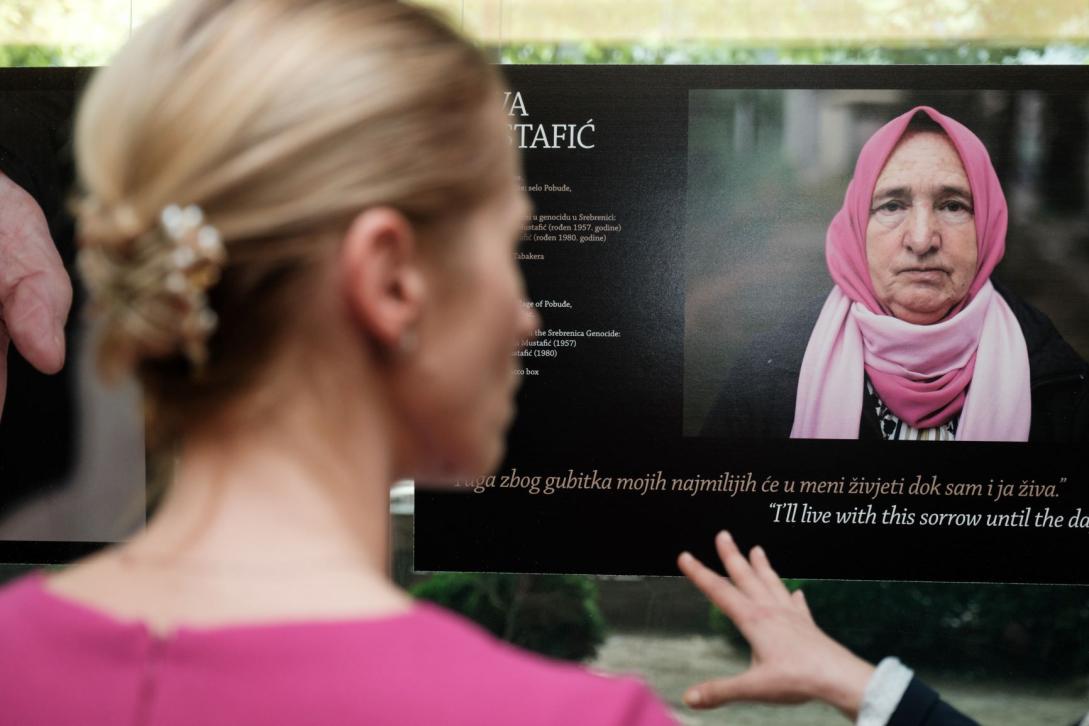MEMENTO: Fragments of the Srebrenica Genocide exhibition opens in the HQ of the European External Action Service in Brussels

Brussels, 25 June 2025 – The “MEMENTO: Fragments of the Srebrenica Genocide,” exhibition was opened last night in the Headquarters of the European External Action Service in Brussels by the EU High Representative for Foreign Affairs and Security Policy / Vice-President of the European Commission Kaja Kallas, as part of the activities marking 30 years since the Srebrenica genocide.
MEMENTO presents series of powerful personal stories, told through artefacts recovered from mass graves and personal archives. Each object is paired with the portrait and testimony of a survivor or family member who lost loved ones in the genocide. Together, they offer a glimpse into a very personal perspective on the events of July 1995. The exhibition was organised by the European External Action Service (EEAS) in cooperation with the Post-Conflict Research Center (PCRC) from Sarajevo, the Srebrenica Memorial Center, and the Mechanism Information Programme for Affected Communities in The Hague.
At the opening of the exhibition, HR/VP Kallas said, “There are no words to capture our emotions, especially in the face of persistent evil. That is why the images in this exhibition are so powerful. A pocket watch marking a moment when time stopped for its owner. A pair of shorts belonging to a teenager, never to be worn again. The testimony of a woman still looking for her eldest son, thirty years on. I want us all to remember what happened in Srebrenica”.
HR/VP Kallas also made reference to her recent visit to Bosnia and Herzegovina, “I travelled to Sarajevo in April this year and my messages were all about action. I talked about the European Union’s commitment to keeping Bosnia and Herzegovina safe. Bosnia and Herzegovina is part of our European family”.
Thanking the organisers of the exhibition, HR/VP Kallas concluded by saying, “Despite the monstrous intention to wipe out the Bosniak people in Srebrenica, the legacies of those who were killed live on forever. In our memories, and in our mementos – as this exhibition is called. And as this exhibition tries to teach us, remembering atrocity is not an annual ritual. Remembrance is a daily call to challenge hatred, intolerance and injustice. When we do this, we destroy the roots of atrocity”.
Velma Šarić, founder of Post-Conflict Research Center (PCRC), who spoke at the opening of and gave HR/VP a tour of the exhibition, emphasised that this exhibition tells powerful stories of genocide and survival. It includes personal items from the families of victims, items recovered from mass graves in Eastern Bosnia, and from the path known as the ‘Death March.’ “Through these stories, we honour the memory of more than 8000 Muslim men and boys who were killed in the Srebrenica genocide. It is a strong reminder of Bosnia’s ongoing journey toward peace and justice. Through our work, we hope to inspire young people to learn from the past, promote peace, and stand against hate and violence — now and in the future.”
Mirela Osmanović from the Srebrenica Memorial Centre also delivered a speech at the opening of the exhibition stating, “Thirty years have passed since the genocide in Srebrenica. For many, that is a distant history. But for us—for survivors, for families of victims, for those of us working at the Memorial Centre—it remains deeply present. Not out of a desire to stay in the past, but because justice and dignity are not things you bury and move on from. They are built over time, with truth and with care. In a time when denial is becoming louder, in a time when war criminals are not only defended, but openly glorified—when murals replace court verdicts, and silence meets hate speech—this exhibition stands as a reminder that truth is not a matter of opinion. It is a matter of record, and of moral responsibility.”
In addition to the exhibition, the documentary film “Samir Mehić Bowie - Letters from Srebrenica”, about the life of the Srebrenica guitarist, will be screened in Brussels on 1 July 2025 at 18:00 hrs at the Bozar Centre for Fine Arts. The screening will be followed by a panel discussion.
